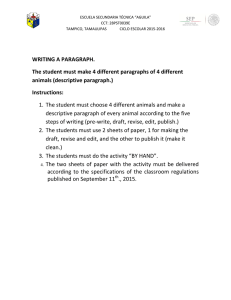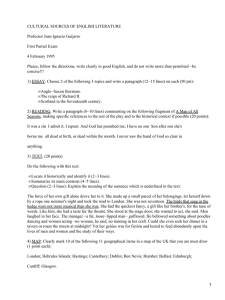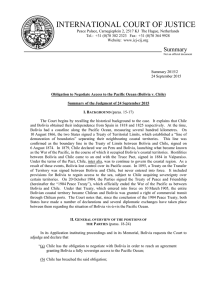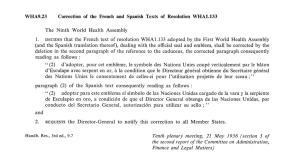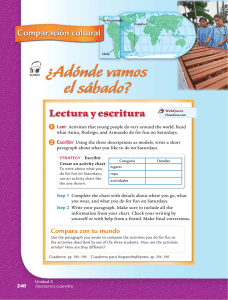Options available under Article 79, paragraph 9, of the Rules
Anuncio
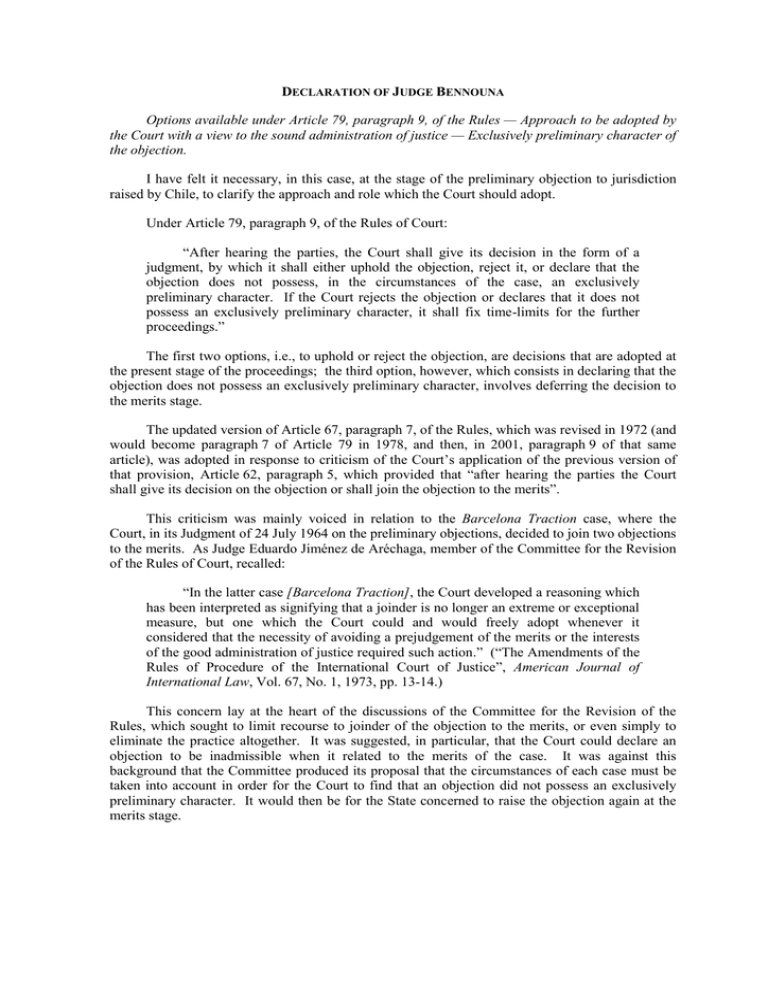
DECLARATION OF JUDGE BENNOUNA Options available under Article 79, paragraph 9, of the Rules — Approach to be adopted by the Court with a view to the sound administration of justice — Exclusively preliminary character of the objection. I have felt it necessary, in this case, at the stage of the preliminary objection to jurisdiction raised by Chile, to clarify the approach and role which the Court should adopt. Under Article 79, paragraph 9, of the Rules of Court: “After hearing the parties, the Court shall give its decision in the form of a judgment, by which it shall either uphold the objection, reject it, or declare that the objection does not possess, in the circumstances of the case, an exclusively preliminary character. If the Court rejects the objection or declares that it does not possess an exclusively preliminary character, it shall fix time-limits for the further proceedings.” The first two options, i.e., to uphold or reject the objection, are decisions that are adopted at the present stage of the proceedings; the third option, however, which consists in declaring that the objection does not possess an exclusively preliminary character, involves deferring the decision to the merits stage. The updated version of Article 67, paragraph 7, of the Rules, which was revised in 1972 (and would become paragraph 7 of Article 79 in 1978, and then, in 2001, paragraph 9 of that same article), was adopted in response to criticism of the Court’s application of the previous version of that provision, Article 62, paragraph 5, which provided that “after hearing the parties the Court shall give its decision on the objection or shall join the objection to the merits”. This criticism was mainly voiced in relation to the Barcelona Traction case, where the Court, in its Judgment of 24 July 1964 on the preliminary objections, decided to join two objections to the merits. As Judge Eduardo Jiménez de Aréchaga, member of the Committee for the Revision of the Rules of Court, recalled: “In the latter case [Barcelona Traction], the Court developed a reasoning which has been interpreted as signifying that a joinder is no longer an extreme or exceptional measure, but one which the Court could and would freely adopt whenever it considered that the necessity of avoiding a prejudgement of the merits or the interests of the good administration of justice required such action.” (“The Amendments of the Rules of Procedure of the International Court of Justice”, American Journal of International Law, Vol. 67, No. 1, 1973, pp. 13-14.) This concern lay at the heart of the discussions of the Committee for the Revision of the Rules, which sought to limit recourse to joinder of the objection to the merits, or even simply to eliminate the practice altogether. It was suggested, in particular, that the Court could declare an objection to be inadmissible when it related to the merits of the case. It was against this background that the Committee produced its proposal that the circumstances of each case must be taken into account in order for the Court to find that an objection did not possess an exclusively preliminary character. It would then be for the State concerned to raise the objection again at the merits stage. -2Be that as it may, the 1972 revision was inspired by the Court’s desire to curb abuse of the preliminary objection procedure, while being well aware that a State always has the right to raise an objection to jurisdiction or admissibility at the merits stage of the case in question. In the case concerning Military and Paramilitary Activities in and against Nicaragua (Nicaragua v. United States of America), Merits, Judgment, I.C.J. Reports 1986, pp. 30-31, para. 41, the Court emphasized that, “[a]bove all, it is clear that a question of jurisdiction is one which requires decision at the preliminary stage of the proceedings”. It is thus only in exceptional circumstances that the Court may find that an objection does not possess an exclusively preliminary character, where it does not have all the elements required to make a decision, or where such a decision would prejudge the dispute, or some aspects thereof, on the merits. Thus, when a preliminary objection to jurisdiction is raised before the Court, as in the present case, the Court must give it due consideration, after hearing the Parties, and decide whether to uphold or to reject it. It is not bound by Article 79, paragraph 9, to begin by characterizing it as preliminary. In deciding to uphold or reject the objection, the Court implicitly regards it as preliminary. Such an approach accords with the sound administration of justice. I accordingly take the view that paragraphs 52 and 53 of the Judgment are redundant and misconceived. The Court had already defined the subject-matter of the dispute submitted to it (paragraph 34), and had dismissed Chile’s objection based on Article VI of the Pact of Bogotá. It had thus concluded that neither had the matters in dispute been “settled by arrangement between the parties, or by arbitral award or by decision of an international court”, nor were they “governed by agreements or treaties in force on the date of the conclusion of the [Pact of Bogotá]”, in the sense of Article VI of that instrument (paragraph 50). One therefore cannot understand why, in paragraphs 52 and 53 of the Judgment, the Court revisits an argument that Bolivia had simply put forward on a subsidiary basis, namely that, in the event that the Court were to accept the definition of the subject-matter of the dispute as proposed by Chile, the latter’s objection would no longer possess an exclusively preliminary character. That argument had become moot once the Court had rejected the definition proposed by Chile. It is therefore difficult to see why, just before setting out the Judgment’s final conclusion, the Court enters into pointless discussions on the issue of the objection’s exclusively preliminary character. (Signed) ___________ Mohamed BENNOUNA.
